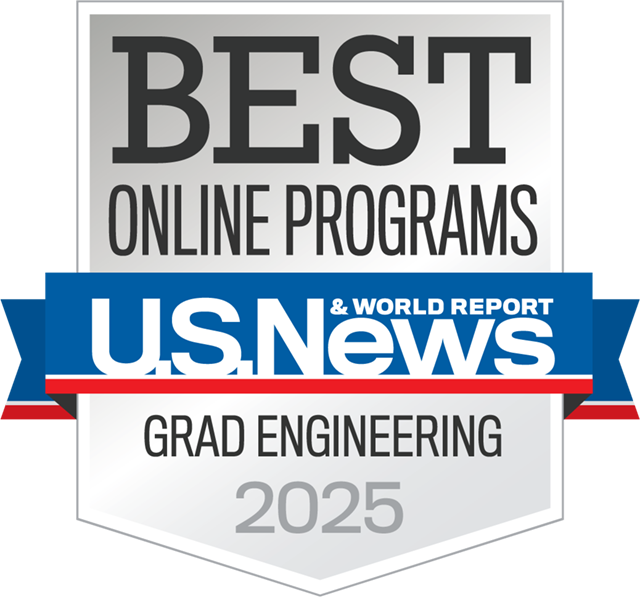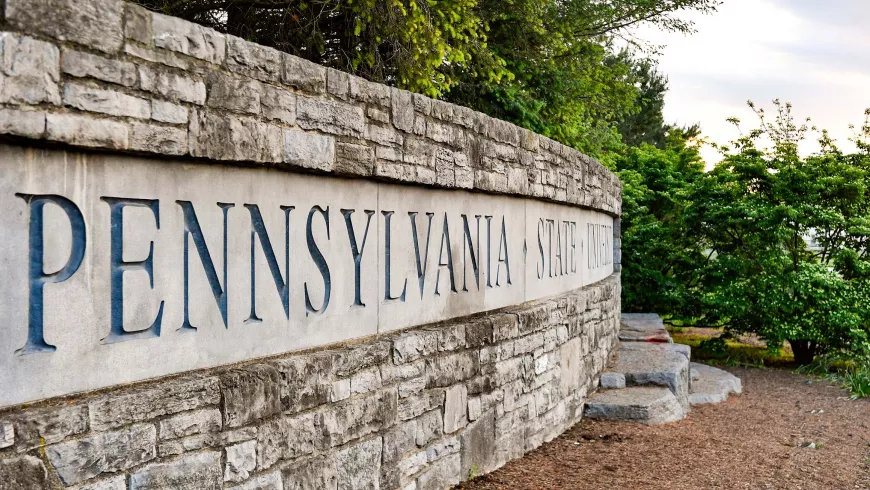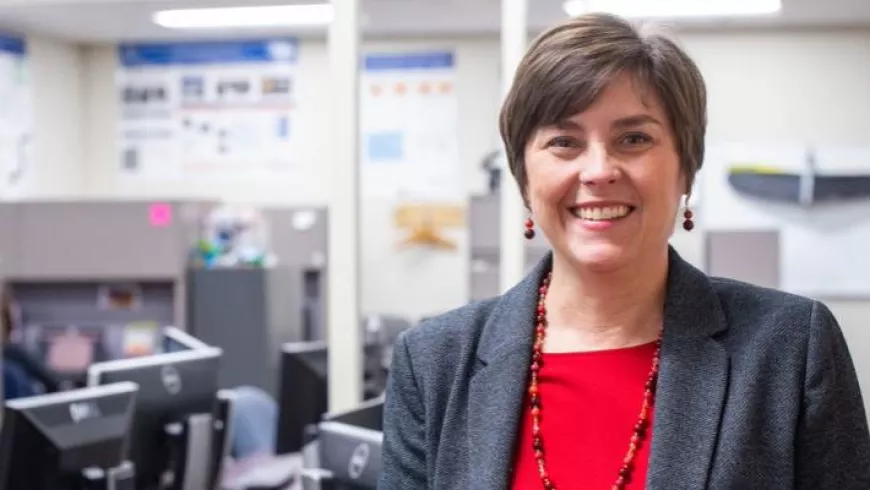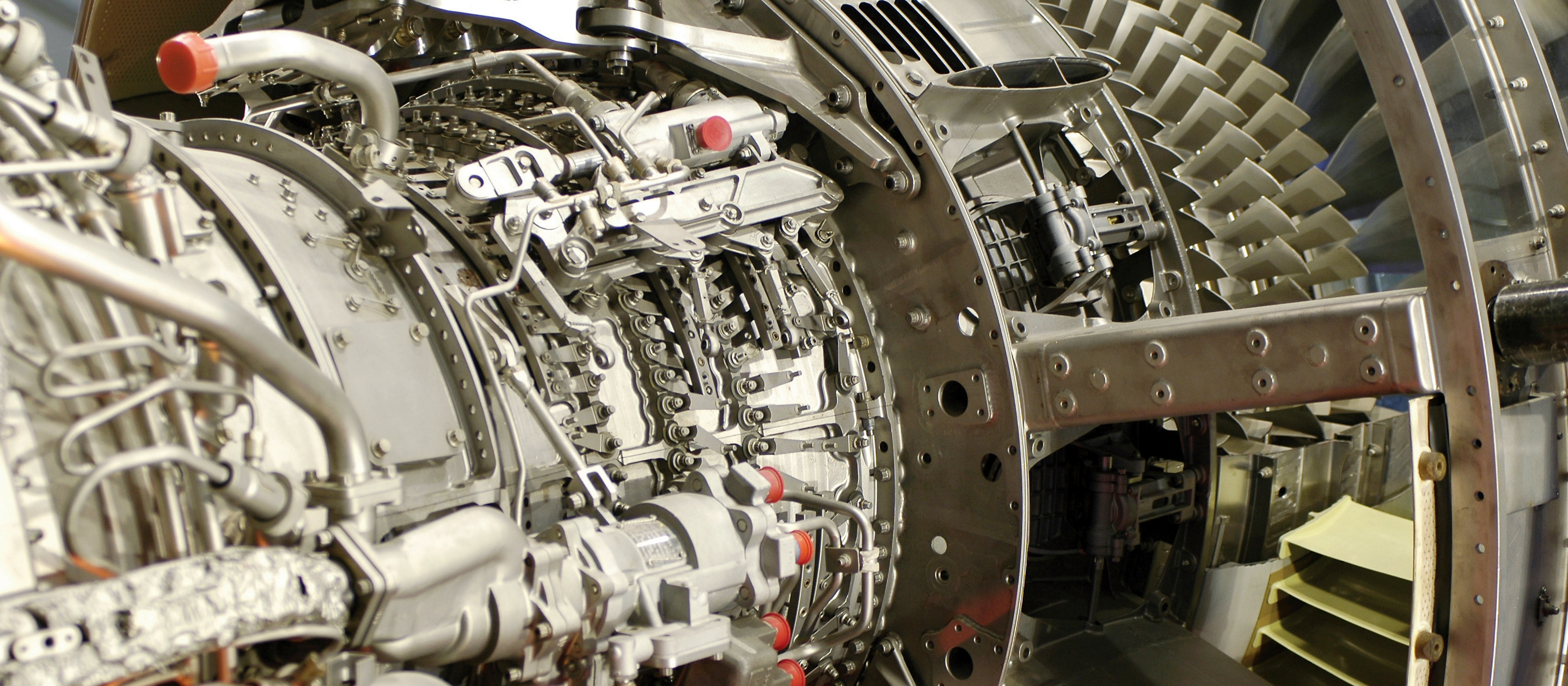100% Online
Complete your Penn State course work at your own pace and 100% online.
Application deadline
Credits and costs
Nationally Recognized

Gain Skills to Help Shape the Future of a Growing Industry
Use your technical knowledge to thrive in the automotive, biomedical, nuclear energy, robotics, power generation, aerospace, and heating, ventilation, and air conditioning (HVAC) industries.
Research, design, create, and test mechanical components and products to be at the forefront of technological advances and play a pivotal role in shaping the future of engineering.
Develop technological visions and advances in computational fluid dynamics, robotics, turbomachinery, and machine learning.
Courses to Advance Your Engineering Knowledge
Courses to Advance Your Engineering Knowledge
The 32-credit online MSME program offers engineering students courses in thermal sciences and mechanical sciences. You'll study topics such as heat transfer, the foundations of fluid mechanics, the principles of turbomachinery, automatic control systems, solid mechanics, and engineering optimization. You will also conduct research alongside faculty to apply theoretical foundations from course work to solve problems.
Academic Seminars (2 credits)
You must successfully complete two 1-credit courses of ME 590 Colloquium, preferably in your first two semesters of the program.
- 1credit
Continuing seminars that consist of a series of individual lectures by faculty, students, or outside speakers.
Math Courses (select 3 credits)
- 3credits
One- and two-dimensional conduction heat transfer for steady state and transient systems with varying boundary conditions.
- Note
If you use ME 512 to satisfy the 3-credit math requirement, it cannot be applied toward the additional 27 credits of required Mechanical Engineering courses.
- 3credits
This course covers ordinary and partial differential equations, linear algebra, numerical methods, special functions, vector calculus, Fourier methods, and complex analysis.
Mechanical Engineering Courses (select 27 credits)
You and your adviser can tailor the program specifically to suit your needs and educational goals by choosing 27 credits from the course lists below.
- At least 15 credits are required in 500-level courses (in addition to the 3 required credits of mathematics).
- A minimum of 12 credits must be at the 400- or 500-level.
Thermal Sciences Courses
If you use ME 512 to satisfy the 3-credit math requirement, it cannot be applied toward the additional 27 credits of required Mechanical Engineering courses.
- 3credits
Conservation laws pertinent to energy conversion and fluid mechanics are applied to pumps, centrifugal compressors, axial compressors and turbines, hydro turbines and wind turbines.
- 3credits
Concepts related to laminar and turbulent premixed and nonpremixed combustion with applications to propulsion and stationary systems.
- 3credits
Theoretical background of sustainability issues and studies of sustainability systems.
- 3credits
One- and two-dimensional conduction heat transfer for steady state and transient systems with varying boundary conditions.
- Note
If you use ME 512 to satisfy the 3-credit math requirement, it cannot be applied toward the additional 27 credits of required Mechanical Engineering courses.
- 3credits
Laminar and turbulent flow heat transfer in natural and forced convection systems.
- 3credits
Heat transfer processes involving evaporation, boiling, and condensation.
- 3credits
Two-dimensional subsonic flow; similarity rules; theory of characteristics; supersonic and hypersonic flows; nonsteady flow; oblique shock waves.
- 3credits
First semester of core sequence in fluid mechanics; Navier-Stokes equations, potential flow, low Re flow, laminar boundary layers.
- 3credits
Second semester of core sequence in fluid mechanics; continuation of boundary layers, stability, transition, turbulence, turbulent boundary layers, turbulence models.
- Prerequisite
ME 421, ME 521
- 3credits
Application of finite difference methods to the study of potential and viscous flows and conduction and convection heat transfer.
- 3credits
Theoretical formulations and methods of solution of engineering problems and physical/chemical processes in various propulsion systems.
- 3credits
An introduction to kinetic theory, statistical mechanics, quantum mechanics, atomic and molecular structure, chemical thermodynamics, and chemical kinetics of gases.
Mechanical Sciences Courses
- 3credits
This course conducts investigations of one-dimensional, two-dimensional, and three-dimensional dynamics, kinematics and design integrated into the study of vehicle dynamics.
- 3credits
Dynamic analysis of systems involving automatic control of position, speed, power, flow, pressure, temperature, and other physical quantities.
- 3credits
Computer modeling and fundamental analysis of solid, fluid, and heat flow problems using existing computer codes.
- 3credits
Design and analysis of mechanical linkages including kinematic synthesis and dynamic analysis.
- 3credits
Techniques and formulations for computer-based kinematic and dynamic analyses of machines.
- 3credits
Formal courses given infrequently to explore, in depth, a comparatively narrow subject which may be topical or of special interest.
- 3credits
This course provides an overview of the fundamental principles and methods of optimal control, dynamic programming, and extremum-seeking control, with a focus on the application of these tools to a variety of problems in the energy generation, storage, and management domain.
- 3credits
Advanced problems and techniques in the design of automatic control systems with emphasis on stability, controller design, and optimum performance.
- 3credits
Introduction to continuum mechanics, variational methods, and finite element formulations; application to bars, beams, cylinders, disks, and plates.
- 3credits
Advanced theory of semidiscrete formulations for continua and structures; emphasizes dynamic and nonlinear problems.
- 3credits
Application of numerical optimization techniques to design mechanical and structural systems; design sensitivity analysis.
- 3credits
Introduces computational fundamentals, including digital logic; programming language, basic numerical analysis and data processing, as applied to mechanical simulation techniques.
- 3credits
Formal courses given on a topical or special interest subject which may be offered infrequently.
M.S. Paper
As part of the ME 596 Individual Studies course, you will be required to write a paper on a topic that you and your faculty adviser mutually agree is suitable for publication in a professional journal or presentation at a national or international conference, in order to obtain this degree.
- 1–3credits
Creative projects, including nonthesis research, which are supervised on an individual basis and which fall outside the scope of formal courses. You will be required to write a paper on a topic that you and your faculty adviser mutually agree is suitable for publication in a professional journal or presentation at a national or international conference, in order to obtain this degree.
- Note
A maximum of 3 credits can be counted toward this degree program.
Special Topics
ME 597 offers a topical or special interest subject which may be offered infrequently.
- 3credits
Formal courses given on a topical or special interest subject which may be offered infrequently.
- 3credits
Formal courses given on a topical or special interest subject which may be offered infrequently.
Collaborative Learning
The online courses are collaborative, allowing you to build strong ties with other students and gain perspectives from other disciplines and industries. The program maintains maximum flexibility in an effort to meet both the professional needs of individual students and quality academic standards.
Course Availability
If you're ready to see when your courses will be offered, visit our public LionPATH course search (opens in new window) to start planning ahead.
Advance Your Career

Advance Your Career
You can use the knowledge gained from this mechanical engineering graduate program and the support of Penn State career resources to pursue careers in a variety of fields, depending on your goals.
Job Titles Related to This Degree
The following roles are often held by people with this type of degree:
- Engineering Group Manager
- Mechanical Design Engineer
- Mechanical Engineering Manager
- Process Engineering Manager
- Project Engineer
Employment Outlook for Occupational Fields Related to This Degree
Estimates of employment growth and total employment are provided by the U.S. Bureau of Labor Statistics and are subject to change. While these occupations are often pursued by graduates with this degree, individual outcomes may vary depending on a variety of factors. Penn State World Campus cannot guarantee employment in a given occupation.
Mechanical Engineers
Architectural and Engineering Managers
Career Services to Set You Up for Success

From the day you're accepted as a student, you can access resources and tools provided by Penn State World Campus Career Services to further your career. These resources are beneficial whether you're searching for a job or advancing in an established career.
- Opportunities to connect with employers
- Career counselor/coach support
- Occupation and salary information
- Internships
- Graduate school resources
Ready to Learn More?
Get the resources you need to make informed decisions about your education. Request information on this program and other programs of interest by completing this form.
Ready to take the next step toward your Penn State master's degree?
Costs and Financial Aid
Costs and Financial Aid
Learn about this program's tuition, fees, scholarship opportunities, grants, payment options, and military benefits.
Graduate Tuition
Graduate tuition is calculated based on the number of credits for which you register. Tuition is due shortly after each semester begins and rates are assessed every semester of enrollment.
2025–26 Academic Year Rates
| How many credits do you plan to take per semester? | Cost |
|---|---|
| 11 or fewer | $1,154 per credit |
| 12 or more | $13,860 per semester |
Financial Aid and Military Benefits
Some students may qualify for financial aid. Take the time to research financial aid, scholarships, and payment options as you prepare to apply. Federal financial aid may only be used to pay for credits used to satisfy program requirements.
Military service members, veterans, and their spouses or dependents should explore these potential military education benefits and financial aid opportunities, as well.
Additional Cost of Attendance Details
To view the detailed list of cost of attendance elements:
- visit the Tuition Information site
- click the plus sign to expand the table
- select a semester from the World Campus row
Technical Requirements
Review the technical requirements for this program.
Who Should Apply?
Professionals with an undergraduate degree in a suitable engineering field or a related science discipline can be well-suited for this master’s program.
Set Your Own Pace

Set Your Own Pace
Whether you are looking to finish your program as quickly as possible or balance your studies with your busy life, Penn State World Campus can help you achieve your education goals. Many students take one or two courses per semester.
Our online courses typically follow a 12- to 15-week semester cycle, and there are three semesters per year (spring, summer, and fall).
Looking to fit your education into a busy life?
You can complete courses at your own pace while maintaining your professional and personal responsibilities. Most students take just one online course per semester.
Looking to earn your degree as quickly as possible?
If you take two courses per semester, it's possible to complete this degree more quickly. Most graduate-level programs recommend a slower pace, and you should consult with your adviser if you would like to take three or more courses in a semester.
Convenient Online Format
This program's convenient online format gives you the flexibility you need to study around your busy schedule. You can skip the lengthy commute without sacrificing the quality of your education and prepare yourself for more rewarding career opportunities without leaving your home.
A Trusted Leader in Online Education

Penn State has a history of more than 100 years of distance education, and World Campus has been a leader in online learning for more than two decades. Our online learning environment offers the same quality education that our students experience on campus.
Information for Military and Veterans

Are you a member of the military, a veteran, or a military spouse? Please visit our military website for additional information regarding financial aid, transfer credits, and application instructions.
How to Apply to Penn State

How to Apply to Penn State
Apply by December 1 to start January 12
Application Instructions
Deadlines and Important Dates
Complete your application and submit all required materials by the appropriate deadline. Your deadline will depend on the semester you plan to start your courses.
Spring Deadline
Apply by December 1 to start January 12Fall Deadline
Apply by July 15, 2026, to start August 24, 2026
Steps to Apply
For admission to the J. Jeffrey and Ann Marie Fox Graduate School, an applicant must hold either (1) a baccalaureate degree from a regionally accredited U.S. institution or (2) a tertiary (postsecondary) degree that is deemed comparable to a four-year bachelor's degree from a regionally accredited U.S. institution. This degree must be from an officially recognized degree-granting institution in the country in which it operates.
It is expected that students will have a bachelor of science degree in a suitable engineering field. Admission decisions will also be based on relevant work experience and recommendation letters. All applicants are expected to have earned a junior/senior grade point average of 3.0 or higher. Most successful applicants have a cumulative GPA of 3.5 or higher.
The program contains a number of courses requiring a solid background in mathematics typically found in an undergraduate program in engineering, physics, chemistry, mathematics, or computer science, with at least two semesters of calculus. Students with other undergraduate majors who have a strong background in mathematics may apply. The admissions committee will consider the academic background, as evidenced by the transcript, as part of the overall application.
Applications are submitted electronically and include a nonrefundable application fee. You will need to upload the following items as part of your application:
Official transcripts from each institution attended, regardless of the number of credits or semesters completed. Transcripts not in English must be accompanied by a certified translation. If you are a Penn State alum, you do not need to request transcripts for credits earned at Penn State but must list Penn State as part of your academic history.
GPA and Test Scores — Official GRE test scores will be considered if submitted, but are NOT required. All applicants are expected to have earned a junior/senior grade point average of 3.0 or higher. Most successful applicants have a cumulative GPA of 3.5 or higher.
English Proficiency — The language of instruction at Penn State is English. With some exceptions, international applicants must take and submit scores for the Test of English as a Foreign Language (TOEFL) or International English Language Testing System (IELTS). Minimum test scores and exceptions are found in the English Proficiency section on the Fox Graduate School's "Requirements for Graduate Admission" page. Visit the TOEFL website for testing information. Penn State's institutional code is 2660.
References (3) — You will need to initiate the process through the online application by entering names, email addresses, and mailing addresses of three references. Upon submission of your application, an email will be sent to each reference requesting they complete a brief online recommendation regarding your commitment for success in an online program. Please inform all recommenders they must submit the form in order for your application to be complete.
Program-Specific Questions/Materials
Résumé — Upload your résumé to the online application.
Statement of Purpose — A one- to two-page statement of purpose outlining personal career goals and reasons for wanting to enroll in the program. This statement should be specific and include information about your short- and long-term goals and how enrolling in the program may help to achieve them. The statement of purpose also offers you the opportunity to demonstrate your writing and communication skills, specify examples of leadership, and provide pertinent information that will assist the committee in selecting candidates who can benefit from and contribute to the mechanical engineering program.
To begin the online application, you will need a Penn State account.
Create a New Penn State Account
If you have any problems during this process, contact an admissions counselor at [email protected].
Please note: Former Penn State students may not need to complete the admissions application or create a new Penn State account. Please visit our Returning Students page for instructions.
You can begin your online application at any time. Your progress within the online application system will be saved as you go, allowing you to return at any point as you gather additional information and required materials.
- Choose Enrollment Type: "Degree Admission"
- Choose "WORLD CAMPUS" as the campus
Checking Your Status
You can check the status of your application by using the same login information established for the online application form.Applying as a Nondegree Graduate Student
Enrollment in this program's courses is limited to degree-seeking students (including provisionally admitted degree-seeking students). Requests to enroll in Mechanical Engineering courses from nondegree students will be evaluated on a case-by-case basis. Enrollment requests should be sent to the Department of Mechanical Engineering at [email protected].
5. Complete the application.
Admissions Help
If you have questions about the admissions process, contact an admissions counselor at [email protected].
Contact Us

Contact Us
Have questions or want more information? We're happy to talk.
To learn more about the Master of Science in Mechanical Engineering, please contact:
World Campus Admissions Counselors
Phone: 814-863-5386
[email protected]
College of Engineering
Department of Mechanical Engineering
127 Reber Building
University Park PA 16802
Phone: 814-865-1345
[email protected]
Learn from the Best
Learn from the Best
The Master of Science in Mechanical Engineering is offered in partnership with the Penn State College of Engineering and led by renowned faculty members.
Faculty
Ashok Belegundu
- DegreePh.D., Civil Engineering, University of Iowa
- DegreeB.Tech., Civil Engineering, I.I.T. Madras
Design optimization, nonlinear and dynamic finite element analysis.
Catherine Berdanier
- DegreePh.D., Engineering Education, Purdue University
- DegreeM.S., Aeronautical and Astronautical Engineering, Purdue University
- DegreeB.S., Chemistry, University of South Dakota
Engineering cognition research; methods development for engineering education research; mixed methods research; eye-tracking methods.
Sean Brennan
- DegreePh.D., Mechanical Engineering, University of Illinois at Urbana-Champaign
- DegreeM.S., Mechanical Engineering, University of Illinois at Urbana-Champaign
- DegreeB.S., Mechanical Engineering, New Mexico State University
- DegreeB.S., Physics, New Mexico State University
Ground vehicle dynamics and automation, mechatronics and embedded systems, data representations for map-based localization and robot guidance.
Margaret Byron
- DegreePh.D., Civil and Environmental Engineering, University of California Berkeley
- DegreeM.S., Civil and Environmental Engineering, University of California Berkeley
- DegreeB.S.E., Mechanical and Aerospace Engineering, Princeton University
Motion of both passive particles and aquatic organisms in turbulent flow, focusing on intermediate scales and Reynolds numbers; scale-dependent complexity of organism/environment interaction.
Fan-Bill Cheung
DegreePh.D., Mechanical Engineering, University of Notre DameMultiphase heat transfer, thermal processing of materials, nuclear reactor thermal hydraulics and safety.
John Cimbala
- DegreePh.D., Aeronautics, California Institute of Technology
- DegreeM.S., Aeronautics, California Institute of Technology
- DegreeB.S., Aerospace Engineering, Penn State
Fluid dynamics, flow visualization, wind tunnels, neutron radiography, turbulence, computational fluid dynamics (CFD), turbulence modeling, turbomachinery, air pollution, stratified tanks, indoor air quality, heat pipes, instrumentation, hydroturbines.
Mary Frecker
- DegreePh.D., Mechanical Engineering, University of Michigan
- DegreeM.S., Mechanical Engineering, University of Michigan
- DegreeB.M.E., Mechanical Engineering, University of Dayton
Optimal design, compliant mechanisms, smart structures, medical device design.
Aman Haque
- DegreePh.D., Mechanical Engineering, University of Illinois at Urbana Champaign
- DegreeM.B.A., University of Alberta
- DegreeM.S, Industrial and Production Engineering, Bangladesh University of Engineering and Technology
- DegreeB.S., Mechanical Engineering, Bangladesh University of Engineering and Technology
Mechanical, electrical and thermal properties of ultrathin films; insitu transmission electron microscopy; MEMS; nano-scale materials behavior.
Dan Haworth
- DegreePh.D., Mechanical Engineering, Cornell University
- DegreeB.S., Mechanical Engineering, Carnegie Mellon University
Numerical modeling of chemically reacting turbulent flows. Computational fluid dynamics. Reciprocating-piston internal combustion engines.
Reuben Kraft
- DegreePostdoctoral, Mechanics, U.S. Army Research Laboratory
- DegreePh.D., Mechanical Engineering, Johns Hopkins University
- DegreeM.S., Mechanical Engineering, Johns Hopkins University
- DegreeB.S., Mechanical Engineering, University of Maryland, Baltimore County
Computational solid mechanics, finite element analysis, numerical modeling, blast physics, high- performance computing.
Robert Kunz
- DegreePh.D., Aerospace Engineering, Penn State
- DegreeM.S., Aeronautical and Astronautical Engineering, University of Illinois
- DegreeB.S., Aerospace Engineering, SUNY at Buffalo
Computational fluid dynamics, multiphase flows, turbomachinery, nuclear reactor thermal-hydraulics and thermal management analysis.
Stephen Lynch
- DegreePh.D., Mechanical Engineering, Virginia Tech
- DegreeM.S., Mechanical Engineering, Virginia Tech
- DegreeB.S., Mechanical Engineering, University of Wyoming
Convective heat transfer and turbulent boundary layers, gas turbine heat transfer and aerodynamics, advanced experimental diagnostics.
Jaqueline O'Connor
- DegreePh.D., Aerospace Engineering, Georgia Institute of Technology
- DegreeM.S., Aerospace Engineering, Georgia Institute of Technology
- DegreeB.S., Aeronautics and Astronautics, Massachusetts Institute of Technology
The Reacting Flow Dynamics Laboratory focuses on issues of reacting flows for energy and propulsion applications. High-speed laser diagnostics and other state-of-the-art experimental techniques are used in research areas like combustion and hydrodynamics.
Zoubeida Ounaies
- DegreePh.D., Engineering Sc. and Mech., Penn State
- DegreeM.S., Mechanical Engineering, Penn State
- DegreeB.S., Mechanical Engineering, Penn State
Smart materials, with a particular focus on design and development of unique combinations of mechanical-electrical-chemical coupling in polymers and polymer nanocomposites; characterization of dielectric materials for sensing, actuation and energy storage.
Laura Pauley
- DegreePh.D., Mechanical Engineering, Stanford University
- DegreeM.S., Mechanical Engineering, Stanford University
- DegreeB.S., Mechanical Engineering, University of Illinois
Computational fluid dynamics, boundary layer separation, large-eddy simulation, direct numerical simulation, cavitation inception, engineering education.
Chris Rahn
- DegreePh.D., Mechanical Engineering, University of California, Berkeley
- DegreeM.S., Mechanical Engineering, University of California, Berkeley
- DegreeB.S., Mechanical Engineering, University of Michigan
Dynamic systems modeling, design, analysis, and control with applications to flexible structures; biologically inspired robotics; smart material actuators, sensors, and energy harvesters; and electrochemical energy storage.
Alex Rattner
- DegreePh.D., Mechanical Engineering, Georgia Institute of Technology
- DegreeB.S., Mechanical Engineering and Applied Mechanics, University of Pennsylvania
Sustainable thermal-fluid energy systems, waste heat recovery, multiphase flow heat and mass transfer, high performance computing.
Alok Sinha
- DegreePh.D., Mechanical Engineering, Carnegie Mellon University
- DegreeB.S., Mechanical Engineering, Indian Institute of Technology, Delhi
Turbine blade vibration, magnetic bearings, active vibration control, sliding mode control, robust control, neural network.
H.J. Sommer
- DegreePh.D., Mechanical Engineering, University of Illinois at Urbana
- DegreeM.S., Mechanical Engineering, University of Illinois at Urbana
- DegreeB.S., Mechanical Engineering, University of Illinois at Urbana
Kinematics, biomechanics, mechatronics, robotics, machine vision, unmanned aircraft.
Adri van Duin
- DegreePh.D., Chemistry, Delft University of Technology
- DegreeDoctorandus, Chemistry, University of Amsterdam
Molecular dynamics simulations on reactive and nonreactive systems; applications to combustion, catalysis and material failure.
Chao-Yang Wang
- DegreePh.D., Mechanical Engineering, University of Iowa
- DegreeM.S., Mechanical Engineering, Zhejiang University
- DegreeB.S., Mechanical Engineering, Zhejiang University
Multiphase transport, batteries, and fuel cells.
Yuan Xuan
- DegreePh.D., Aeronautical Engineering, California Institute of Technology
- DegreeM.S., Aeronautics and Aerospace Engineering, California Institute of Technology
- DegreeM.S., Mechanical Engineering, Ecole Polytechnique
- DegreeB.S., Mechanical Engineering, Ecole Polytechnique
Computational fluid dynamics, turbulent combustion, soot formation, numerical methods, uncertainty quantification.
Richard Yetter
- DegreePh.D., Mechanical Engineering, Princeton University
- DegreeM.A., Mechanical Engineering, Princeton University
- DegreeM.S., Mechanical Engineering, Cornell University
- DegreeB.S., Mechanical Engineering, Syracuse University
Combustion/environmental science, combustion chemistry, heterogeneous combustion, materials synthesis, propellant combustion, combustion generated pollutants, atmospheric plume chemistry and chemical processing.
Additional Faculty
The faculty listed above regularly teach for the Penn State World Campus Master of Science in Mechanical Engineering program. View the complete Department of Mechanical Engineering Faculty and Staff directory.
News



